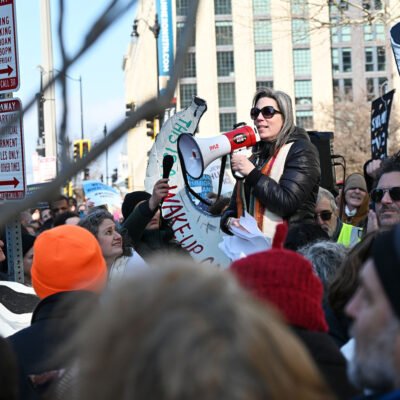Many of Migdalia’s plays, from the very early Miriam’s Flowers to Fishtank and Two Roberts in this volume, live in limbo lands, the “where do I go now” purgatory of life just after death. She is our bard of the bardo, and, like that other, earlier bard, Migdalia loves a ghost. In her three impossible plays, I count at least eight of them, not including the ghost of her childhood in the Bronx and of Puerto Rico, where her people are from. Yes, place haunts you too, just like history.
“When you bury someone, where are they really? The ground? The sky?” Anabella asks in Fishtank, as she and her older sister Juliana attempt to clear out the roach-ridden, hoarder-crammed, trash heap of a house they’ve just inherited from their parents who died suddenly, one after another, in the pandemic. “Or are they still hanging around their house? Waiting to see if it sticks. Or if they can stick onto you?”
Of course Ma and Pop are still hanging around the house. There’s work to be done, haunting their daughters and making sure they find the buried treasure of their inheritance and the buried secrets of their family. The dead linger nearby, or maybe they permeate our bodies. Juliana wonders about that: “Because of the disease. So many people had to be burned. I wonder if the smoke could have blown you into the wind and then into my lungs, and if it did, would I know if you were still inside me somewhere, I mean, whenever I took a breath?”
Theatre is a physical, visceral art, and Migdalia’s writing works in and on the body, a site inseparable from the mind. “When Art, History, and Time braid together in my world,” she has written, “I feel it in my viscera. I feel a strength—in my convictions, my voice, my reason for being.” When Amador, the father in Fishtank, speaks from the outskirts of life, I hear what it must be like for Migdalia to write as she does: “When I was trying to breathe, I was going to all different times and places. My mind is a piece of tumbled sea glass. I passed through so many waves. So many changes. That’s what stories are: these word-waves that wash over me.”
And lest you think that only family haunts the living, consider the other five characters in Fishtank, each of whom steps out of pictures the now-dead parents stuck up on the wall above the smelly family aquarium: Martin (as in Luther King, Jr.), Robert (F. Kennedy), Shirley (Chisholm), and two Jesuses, one white and one black. They hang around, chatting and arguing, playing games, trying to remember their own lost lives. (I don’t want to spoil anything but there’s also, between the Black Jesus and the White one, some licking.)
Two Jesuses licking ain’t got nothing on the monstrous, psychosexual mayhem of Migdalia’s Satyricoño, inspired by Petronius’s writing (61 CE) and Fellini’s 1968 film, both orgiastic nightmares lit by the sputtering fires of imperial Rome. It’s the “future-present” of 2058-2064 CE amid “the chaos of the Ignited Dominions of Amerika—what’s left of what used to be the U.S.A.” This time the ghosts of the past and future lurk.
We have moved from the literal worship of civil rights era and Christian icons to a dystopic future of now, fashioned by every dictator ever, specifically the lineup Migdalia had in mind when she began the play early last decade: Mussolini, Franco, Hitler, Trujillo, Castro, Bush. In Satyricoño her Emperor (the “Presidemperor”) diddles himself while “the whole world explodes,” so as our prophetic playwright foretold, the beat goes on. We enter not Mar-a-Lago but La Perla, a nightclub that has been “renovated and made magical. On one wall is a sea of genitalia, animatronic penises, vaginas, and breasts. Like an adult version of the “It’s a Small World” ride, there are patrons strewn about the club in gondolas, equipped with adult pleasuring devices and an intercom to order up pleasure partners or simply snack foods.” Two members of the royal entourage sit in a gondola, “wiping off their hands and genitalia with a wet wipe.”
We catch citizens of the Ignited Dominions of Amerika in individual spotlights:
Each one is trying to kill him or herself—unsuccessfully—over and over again. One slits his throat. One hangs herself. Two take poison. Another one hits his head repeatedly with a dictionary. One holds her head in a deep basin of water until she can no longer breathe—comes up for air, and then tries again. One takes line after line of cocaine—he is covered in white powder. These vignettes are performed to the music of [Fellini’s composer] Nino Rota.
Pig Latin is spoken here. The citizenry appears as Bunraku puppets. “There are many of them and they are all very sad.” And when the sister of the Presidemperor’s bastard son fists her nymphomaniac lover, the royal astrologer, “Sparks come flying from between her legs.” Yes, there will be dildos, French maid costumes, and hermaphrodites. No, it won’t play in Florida. One entrance will be made in a “chariot of fire.”
How many ways can you spell impossible?
Where are our theatre companies that would dedicate the years and resources necessary to cultivate audiences hungry enough to wander in such strange lands?
But why? We’ve seen dream plays before, sexual surrealism, political anarchy—I’m thinking Shakespeare, Goethe, Strindberg, Jarry, even Kushner our contemporary. (Oh, right, they’re men.) And what about the art world? What are theatrical spaces that would make room for the installations of a Joan Jonas or the attic of a Louise Bourgeois? Where are our theatre companies that would dedicate the years and resources necessary to cultivate audiences hungry enough to wander in such strange lands? Where, other than in that vague Everycity appellation “downtown” or in some romantic, experimental, Off-Off-Broadway past, can we celebrate the recesses of such a sensibility or the reaches of such a fantasy? (Tripwire Harlot seems to be asking and having asked, answered.)



